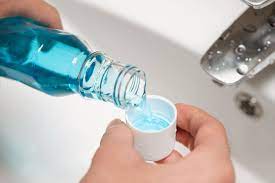Mouthwash, also known as “oral rinse” or “mouth rinse,” often includes flavorings and
antibacterial chemicals to clean in between your teeth. While some varieties of
mouthwash don’t contain alcohol, others do as an inactive component
Mouthwash can have some unfavorable side effects for certain people. The negative
consequences of using an over-the-counter mouth rinse regularly may exceed the
positive results. Others have voiced their concerns with some of the chemical tastes
and colours used in some kinds of mouthwash.
Effects of mouthwash with alcohol
Alcohol is not an antibacterial element; rather, it serves as a preservative and a vehicle
for the other active compounds in mouthwash.
The following mouthwash adverse effects may not be felt by everyone, and some
formulas may produce more or less side effects than others.
May aggravate or bring on canker sores.
Some toothpastes and mouthwashes employ sodium lauryl sulfate (SLS) to produce a
“foaming” effect in your mouth.
Using a mouthwash (or any other oral solution) that contains SLS could provoke an
outbreak of sores or make existing ones worse if you are prone to developing canker
sores. That might also be the case for people who are currently receiving
chemotherapy.
Using mouthwash has increased in popularity in recent years. Many people use
mouthwash either prior to or following tooth brushing. It aids in maintaining oral hygiene
and temporarily eliminating the issue of bad breath.
Fluoride, which is found in several mouthwashes, also contributes to the cleanliness
and whiteness of your teeth. People use mouthwash for all of these causes.
There are many various varieties of mouthwash on the market, so you can always find
something that works well for you. But when you use one, you might wonder: Is it okay
to use mouthwash every day?

